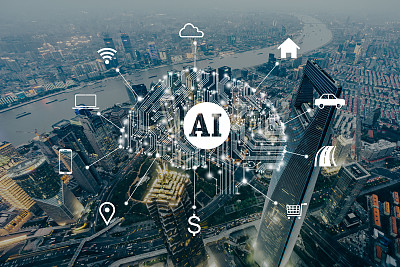
Photo: VCG
As artificial intelligence (AI) is applied in the logistics services sector, the sector’s ecosystem will be reshaped, business insiders told the People’s Daily on Thursday.
The logistics sector is in the middle of a transformation, as emerging technologies, such as cloud computing and AI technology, bring changes that affect both its business model and capital funding, Tian Min, chief technology officer at S.F. Express said.
Automated processes
QR codes are used for sorting, packaging and distribution in JD.com’s automated sorting center in Kunshan, East China’s Jiangsu Province.
The entire sorting center is now unmanned, and its efficiency has been greatly improved. The center can process 9,000 items each hour, replacing the labor of 180 people.
Out of the warehouse, companies are experimenting with AI in the last mile of delivery, with the help of unmanned aerial vehicles (UAV).
In October 2017, Alibaba's logistics arm, Cainiao Network, experimented with UAV delivery. The first trip lasted nine minutes, and delivered a package that weighed almost five kilograms, providing logistics services for Taobao in the countryside.
In June 2017, JD.com announced a UAV center was put into operation, with a mission of strategic planning, conducting research and development, and manufacturing UAV vehicles and technology.
The concept of combining AI technology with logistics was raised in 2009.
S.F. Express Co, a private Chinese express delivery firm, invested 560 million yuan ($88.5 million) for AI-related research and development in 2016. The company has received 64 patents in the UAV field by the first half of 2017.
Intelligent breakthoughs
AI is helping the logistics sector reach breakthroughs in development by reducing cost and improving efficiency.
Compared with traditional logistics technology, AI-enabled logistics services help in saving labor costs and improving efficiency, Silicon Valley-based AI expert Wang Yali told the People’s Daily.
Logistics robots now are used to improve the efficiency of processes including transportation, storage, packaging and distribution.
Through cooperation with Tencent, S.F. Express incorporated AI image recognition for handwritten Chinese characters. Prior to this, 8,000 staff were required to work on inputing characters for orders.
Reshaping the logistics ecosystem
AI is helping rebuild operation processes to unleash the industry’s potential, said Sun Zhixin, director of the Nanjing University of Posts and Telecommunications.
An intelligent cloud platform will facilitate integrated management of the supply chain and create synergy between the information flow and physical flow of items, Sun said.
The new ecosystem will be enabled by AI and other advanced technologies such as cloud computing, big data and the internet of things, integrating the networks of railways, highways and airlines. As a result, one-stop services for logistics services, commodity transactions, financial services and credit businesses will be achieved, Sun said.
Challenges
Experts find a lack of talented AI developers is one of the challenges facing the logistics industry.
Additionally, the lack of both industrial standardization and a social credit mechanism to help ensure collaborators are reliable is also restraining further development.


